I'm having trouble implementing a JOIN query on these two tables.
Product Table contains products. ProductInstance table contains version of product with pricing that were changed over time.
There should exactly be one row for each storeId even if it's null but should contain highest productInstanceId.
My Query can get rows with largest Ids for each product, but ignores StoreIds.
Select P.id as productId, PI.id as productInstanceId, P.name, PI.storeId, PI.price from products as P
LEFT JOIN productInstances AS PI
ON PI.productId = P.id
LEFT JOIN productInstances AS PI2
ON (PI2.productId = P.id and (PI.id < PI2.id ) )
WHERE PI2.id IS NULL
AND PI.id IS NOT NULL
Create Tables:
CREATE SCHEMA IF NOT EXISTS `TestDB` DEFAULT CHARACTER SET utf8 ;
USE `TestDB` ;
-- -----------------------------------------------------
-- Table `TestDB`.`products`
-- -----------------------------------------------------
CREATE TABLE IF NOT EXISTS `TestDB`.`products` (
`id` INT NOT NULL AUTO_INCREMENT,
`name` VARCHAR(45) NOT NULL,
`description` VARCHAR(45) NULL,
PRIMARY KEY (`id`))
ENGINE = InnoDB;
-- -----------------------------------------------------
-- Table `TestDB`.`productInstances`
-- -----------------------------------------------------
CREATE TABLE IF NOT EXISTS `TestDB`.`productInstances` (
`id` INT NOT NULL AUTO_INCREMENT,
`storeId` INT NULL,
`productId` INT NOT NULL,
`price` INT NOT NULL,
PRIMARY KEY (`id`, `productId`),
INDEX `fk_productInstances_products_idx` (`productId` ASC),
CONSTRAINT `fk_productInstances_products`
FOREIGN KEY (`productId`)
REFERENCES `TestDB`.`products` (`id`)
ON DELETE NO ACTION
ON UPDATE NO ACTION)
ENGINE = InnoDB;
INSERT TEST DATA USING THIS QUERY
INSERT INTO `TestDB`.`products` (`name`) VALUES ('Product 1');
INSERT INTO `TestDB`.`products` (`name`) VALUES ('Product 2');
INSERT INTO `TestDB`.`productInstances` (`storeId`, `productId`, `price`) VALUES ('1', '1', '111');
INSERT INTO `TestDB`.`productInstances` (`productId`, `price`) VALUES ('1', '122');
INSERT INTO `TestDB`.`productInstances` (`productId`, `price`) VALUES ('1', '133');
INSERT INTO `TestDB`.`productInstances` (`storeId`, `productId`, `price`) VALUES ('1', '1', '115');
INSERT INTO `TestDB`.`productInstances` (`storeId`, `productId`, `price`) VALUES ('2', '1', '155');
